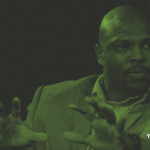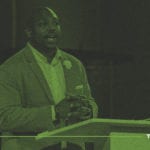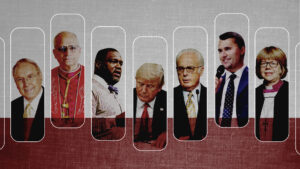Thomas “Tick” Campbell lives in Oxford, Mississippi, where he is a barber and serves as an elder at Grace Bible Church. He is married to Ashley, and they have three young children.
 What do you do every day?
What do you do every day?
I wake up between 4 a.m. and 6 a.m. to work out and spend time with Jesus before I begin my day job as a barber. I don’t just cut hair; I build relationships. I make small talk and pray that God creates an opportunity for me to talk about him. Over time, the door often opens, and many of my clients feel comfortable enough to unload their burdens, and I share Christ with them. Through the years I’ve moved away from bluntly hitting people with the gospel without a relationship and into building relational currency with my clients.
As an image-bearer of God, how does your work reflect some aspect of God’s work?
I don’t believe all preachers are in the pulpit. Not all ministry happens in the church. Every Christian is a minister and ambassador who deals with souls. Dealing with the souls of men is the most delicate thing you can do. My ministry is in that chair. Some days that looks like praying for people who are sick, offering a word of encouragement, or just having good conversation. Every day I feel the weight that the client in the chair could die tomorrow. If I walk into work with that awareness, it changes the way I approach my job.
How does your work give you a unique vantage point into the brokenness of the world?
I see brokenness in the life of almost every head I cut. Evidences of fatherlessness abound when kids come in and mistreat their mothers or lack respect for authority. I hear the stories of children being molested, teens engaging in premarital sex, and parents who don’t know the truth and beauty of the gospel. Every day I see men and women struggling with the basic necessities of life—food, clothing, and shelter. Single mothers frequently come in and can’t pay for haircuts. Mostly I see people who have no hope. Knowing this makes the 20 or 30 minutes I get with them so important.
Jesus commands us to “love our neighbors as ourselves.” How does your work function as an opportunity to love and serve others?
Everyone who walks into the barbershop is my neighbor. I serve those who have fallen on hard times—even if that means I don’t get paid. As I’m cutting a client’s hair, he may share with me that he recently lost his job, so I won’t make him pay for the haircut. I make deals for mothers with multiple kids to help them. On one occasion a young client’s father was in jail, so I cut his hair for free until his father returned home.
Editors’ note: TGCvocations is a weekly column that asks practitioners how they integrate their faith and their work. Interviews are condensed and edited.
Download your free Christmas playlist by TGC editor Brett McCracken!
 It’s that time of year, when the world falls in love—with Christmas music! If you’re ready to immerse yourself in the sounds of the season, we’ve got a brand-new playlist for you. The Gospel Coalition’s free 2025 Christmas playlist is full of joyful, festive, and nostalgic songs to help you celebrate the sweetness of this sacred season.
It’s that time of year, when the world falls in love—with Christmas music! If you’re ready to immerse yourself in the sounds of the season, we’ve got a brand-new playlist for you. The Gospel Coalition’s free 2025 Christmas playlist is full of joyful, festive, and nostalgic songs to help you celebrate the sweetness of this sacred season.
The 75 songs on this playlist are all recordings from at least 20 years ago—most of them from further back in the 1950s and 1960s. Each song has been thoughtfully selected by TGC Arts & Culture Editor Brett McCracken to cultivate a fun but meaningful mix of vintage Christmas vibes.
To start listening to this free resource, simply click below to receive your link to the private playlist on Spotify or Apple Music.


































